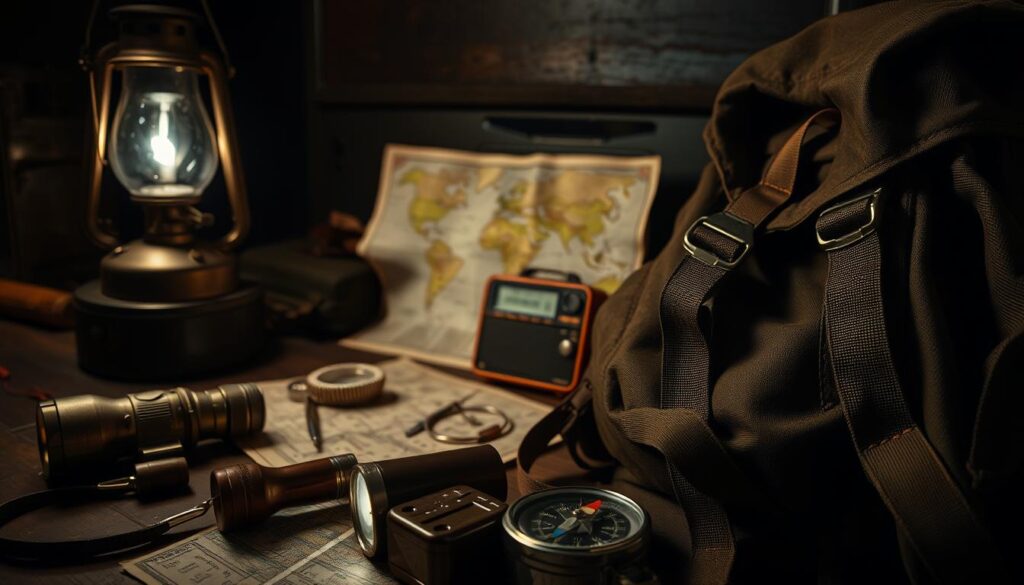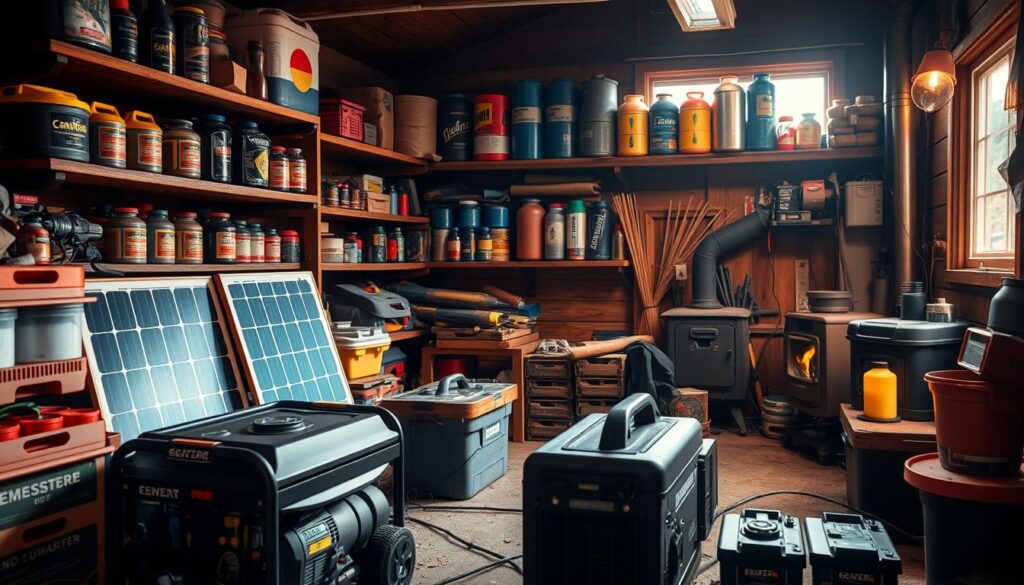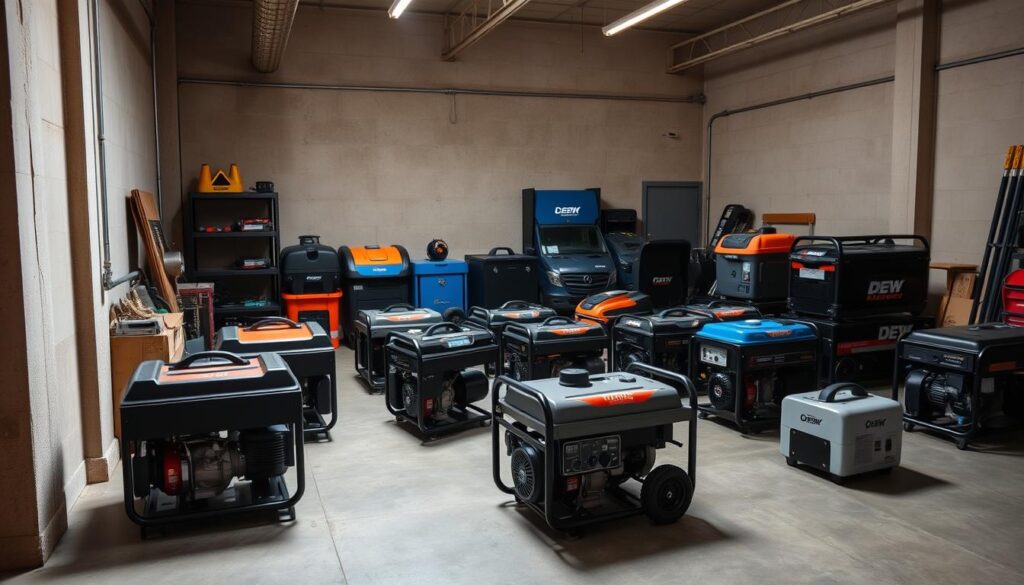A long power outage can be very bad, lasting days, weeks, months, or even years. I’ve learned how important it is to be ready. So, I want to share my best tips to help you prepare for a grid-down situation.
Many experts agree that being prepared is key to surviving such times. A grid-down situation can happen for many reasons. This includes natural disasters, cyberattacks, or failures in our infrastructure, leading to a breakdown in essential services.
To make sure you’re ready, it’s important to know why and what happens in a prolonged outage. By being informed and taking action early, you can greatly improve your chances of getting through this tough time.
Key Takeaways
- Understand the possible reasons for a grid-down situation.
- Know the effects of a long power outage.
- Take steps now to prepare for emergencies.
- Stay updated on the best ways to prepare for emergencies.
- Make a detailed plan to keep yourself safe.
Understanding Grid-Down Power Scenarios
A grid-down situation is a serious concern that needs clear understanding. It happens when a big power outage or electricity failure affects many people. They lose access to electricity.
To get ready for such a situation, knowing what it means and why it happens is key. A grid-down situation happens when the power grid fails. This includes power plants, transmission lines, and distribution systems.
What Is a Grid-Down Situation?
A grid-down situation means a long power outage that hits homes and important places like hospitals. It also affects communication networks and emergency services. This can really disrupt daily life, the economy, and safety.
Potential Causes of Grid Failures
Many things can cause a grid-down situation. These include:
- Cyberattacks on power grid infrastructure
- Natural disasters like hurricanes, earthquakes, and floods
- Solar flares and geomagnetic storms
- Aging or crumbling infrastructure
Knowing these causes is the first step to finding good blackout solutions. By understanding the risks, people and communities can prepare better. This helps lessen the effects of a grid-down situation.
Here’s a quick look at the causes and their effects:
| Cause | Impact |
|---|---|
| Cyberattacks | Disruption of critical infrastructure, possible widespread power outage |
| Natural Disasters | Damage to power grid infrastructure, long power outages |
| Solar Flares | Potential for geomagnetically induced currents (GICs) to cause grid instability |
| Aging Infrastructure | Higher chance of equipment failure, leading to power outages |
By knowing the causes and effects of grid-down situations, people can prepare better. This ensures their safety and keeps essential services running.
Why You Should Prepare for a Grid-Down Situation
Preparing for a grid-down situation is more than just having the right gear. It’s also about knowing how it affects our daily lives. Grid failures can happen for many reasons, like natural disasters or cyberattacks. They leave us and our communities at risk.
The Impact on Daily Life
A grid-down situation can really mess up our daily routines. It can disrupt essential services and communication. Without a backup power supply, keeping our homes comfortable or storing food safely becomes a challenge.
Also, without power, we can’t stay in touch with the world. Most of our communication needs electricity. This can make us feel cut off and unsure. Having backup plans, like ham radios or emergency power solutions, is key.
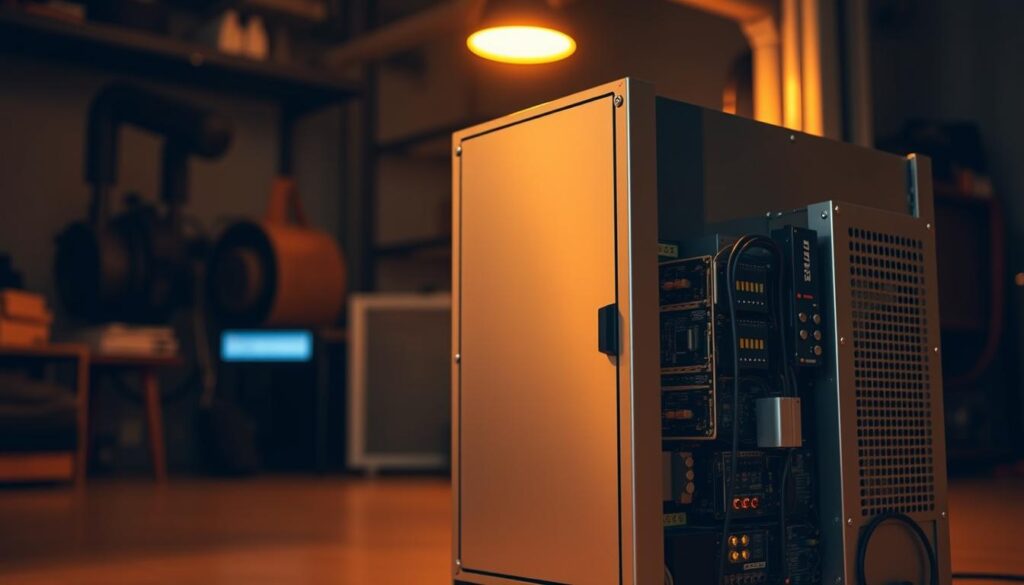
Historical Examples of Grid Failures
Looking at past grid failures teaches us a lot. For example, Hurricane Katrina in 2005 left millions without power. This led to looting, hunger, and dehydration. The 2011 Japanese earthquake and tsunami caused a grid failure too, leading to the Fukushima Daiichi nuclear disaster.
| Event | Year | Consequences |
|---|---|---|
| Hurricane Katrina | 2005 | Widespread looting, hunger, dehydration |
| Japanese earthquake and tsunami | 2011 | Fukushima Daiichi nuclear disaster |
| Puerto Rico Hurricane Maria | 2017 | Prolonged power outage, infrastructure damage |
These examples show why we need emergency generators and off-grid energy solutions. By being prepared, we can stay safe and comfortable during grid failures.
Essential Supplies to Stockpile
Stockpiling the right supplies is key when preparing for a grid-down scenario. Having the necessary items can greatly help you cope with the situation.
Food and Water Storage Recommendations
Ensuring you have enough food and water is critical. Stock up on non-perishable items that are high in calories and nutrients. Canned goods, dried fruits, and nuts are great choices. Also, have a reliable cooking method, like a portable camping stove or solar oven.
Water storage is also vital. Aim to store at least one gallon of water per person per day for drinking, cooking, and hygiene. Consider getting a water filtration system or purification tablets for safe drinking water.
| Food Type | Storage Tips | Shelf Life |
|---|---|---|
| Canned Goods | Store in a cool, dry place | 2-5 years |
| Dried Fruits and Nuts | Keep in airtight containers | 6-12 months |
| MREs | Store in a dry, cool place | 3-5 years |
Important Tools for Power Independence
A reliable power source is essential during a grid-down situation. Invest in a portable power source, like a battery pack or generator. Solar power systems are also great for sustainable energy.
Here are some tools for power independence:
- Solar-powered chargers for your devices
- A portable generator or power bank
- Solar panels for renewable energy
“A well-prepared individual will have a reliable means of generating power, such as a solar power system or a portable generator, to ensure continued access to essential services.”
First Aid and Medical Essentials
A well-stocked first aid kit is vital in a grid-down situation. Include items like bandages, antiseptic wipes, pain relievers, and antihistamines. Also, have prescription medications and essential medical equipment.
It’s wise to have basic medical training, like CPR and first aid certification. This ensures you can respond effectively in emergencies.
Energy Solutions for a Grid-Down Event
Keeping power on during a long grid outage needs careful planning and the right energy solutions. As we talked about earlier, being ready is key to handling such tough situations.
Using solar power systems is a great way to stay energy independent. Solar energy is clean, sustainable, and can be made with solar panels. It gives a clean energy source and cuts down on fossil fuel use.
Solar Power Options
Solar power systems are a good choice for making electricity when the grid is down. They can be set up for different energy needs, from small homes to big businesses.
- Portable solar panels for charging devices and small appliances
- Solar-powered generators for larger energy needs
- Grid-tie solar systems for homes and businesses with battery backup
Energy experts say solar power is getting cheaper and more efficient. It’s a great choice for a reliable energy source in emergencies. A recent energy report shows solar’s growing role in emergency prep.
“The future of energy lies in renewable sources like solar power, which can provide reliable energy during grid failures.”
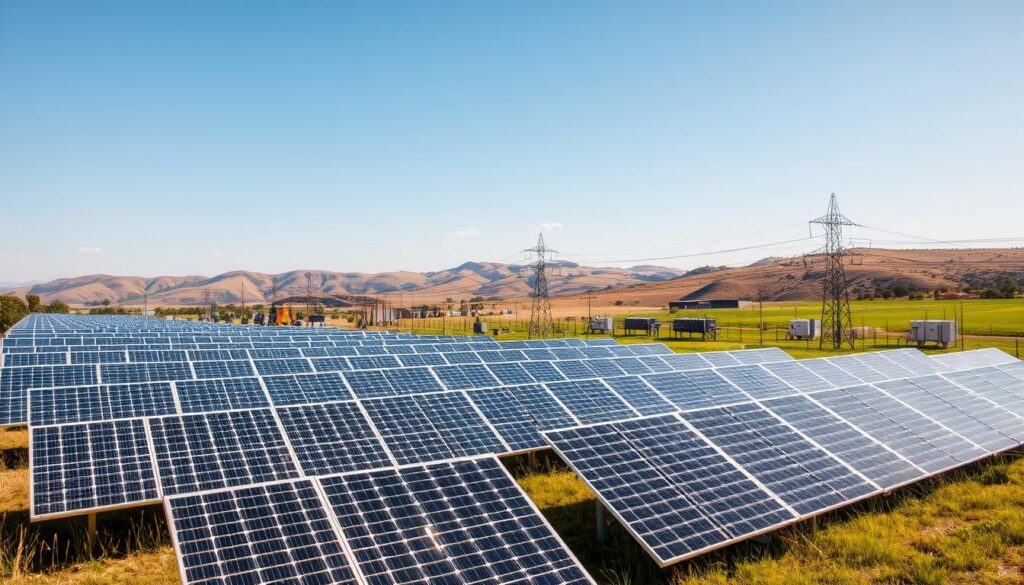
Fuel Alternatives: Generators and More
While solar power is promising, thinking about emergency generators and other fuel options is also key. Generators that run on gasoline, diesel, or propane can offer backup power when it’s needed.
| Generator Type | Fuel Source | Typical Use |
|---|---|---|
| Portable Generators | Gasoline, Propane | Small-scale residential use, camping |
| Standby Generators | Natural Gas, Diesel | Permanent installation for homes and businesses |
| Inverter Generators | Gasoline | Fuel-efficient, quiet operation for sensitive electronics |
When picking a generator, think about fuel efficiency, noise, and power output. A well-kept backup power supply can be a big help during a long grid outage.
Communication Strategies During Outages
Effective communication is key in managing disruptions during a grid-down situation. It helps us stay informed and connected. But, using traditional power-dependent methods can be tough.
To stay informed without power, we need alternative methods. Battery-powered or hand-crank radios are great blackout solutions. They provide updates without needing electricity.
Staying Informed Without Power
Staying informed is vital during emergencies. Battery or solar-powered radios are excellent for getting updates and instructions from authorities. They help you make informed decisions.
Utilizing Ham Radios for Emergency Communication
Ham radios are essential for emergency communication. They allow for two-way communication. This means you can send and receive messages, which is great for coordinating with others.
To use ham radios well, you need the right licenses and to know how to operate them. Many ham radio operators train and practice. This prepares them for emergencies. Adding ham radios to your emergency plan can improve your communication during outages.
By using these strategies, we can better handle power outages. We stay connected and informed, no matter how long the outage lasts.
Home Safety and Security Considerations
Grid-down scenarios need a proactive approach to home safety and security. It’s important to make sure your home is secure and you have a plan for emergencies.
During a grid-down situation, securing your property is a top concern. Securing your home means several steps. This includes making doors and windows stronger, adding security lights, and thinking about a safe room.
Securing Your Property
To secure your property well, follow these steps:
- Make doors stronger with solid core or metal doors and add a deadbolt lock.
- Put up security cameras or lights that turn on when someone moves.
- Have a safe room or a secure spot in your home for family to gather in emergencies.
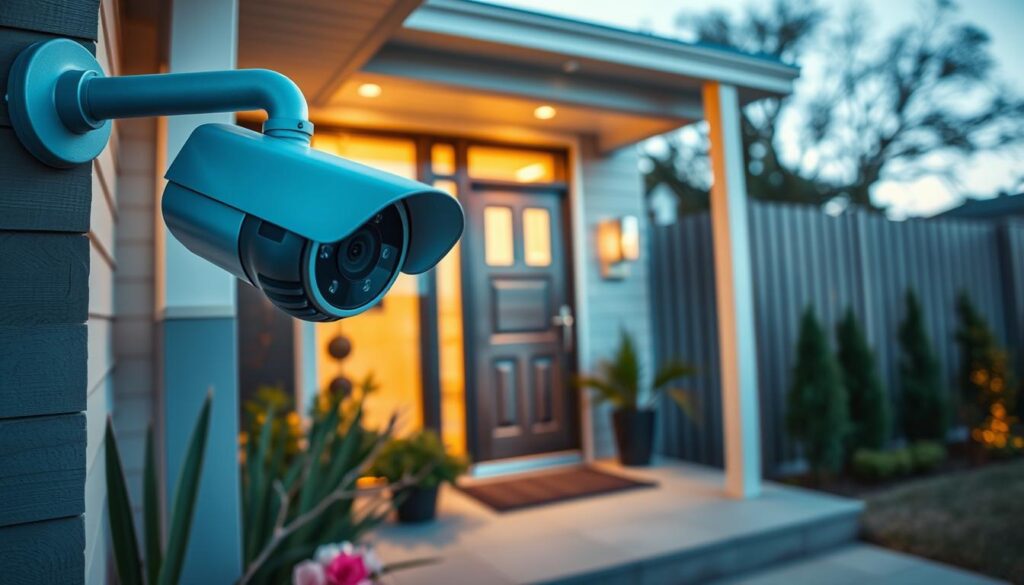
Emergency Plans for Family Members
Having an emergency plan is key for your family’s safety. This includes:
- Make a communication plan with all family members’ contact info.
- Find safe meeting spots inside and outside your home.
- Practice your emergency plan often so everyone knows what to do.
By following these steps, you can make your home safer. And make sure your family is ready for any grid-down situation.
Financial Preparedness for Emergencies
Being financially ready is key to a good emergency plan. It helps you get the things you need when the power goes out. A solid financial plan can really help you get through tough times.
Financial preparedness is more than just saving money. It’s about making a detailed plan. This includes budgeting for emergency supplies and investing for the future.
Budgeting for Prepping Supplies
Creating a budget for emergency supplies is important. First, figure out what you really need, like food, water, and first aid. Here are some tips:
- Check your finances to see how much you can spend on emergency supplies.
- Decide what’s most important based on the emergencies you might face.
- Think about saving money for unexpected costs.
Investing in Long-Term Resources
Investing in long-term resources is also vital. This could mean solar panels or other equipment that lasts a long time. Here are some strategies:
- Look at how much money you can make back from your investments.
- Think about how long your investments will last and if they need upkeep.
- Spread out your investments to be ready for different emergencies.
By budgeting for emergency supplies and investing in long-term solutions, you boost your financial readiness. This makes you stronger when emergencies happen.
Building a Community Support System
Having a strong community support system is key in emergencies. I’ve learned that being ready as an individual is important. But being part of a group is just as vital.
Networking with neighbors is a key part of building this system. By getting to know our neighbors, we can create a safety net for everyone. This means understanding their needs and helping when needed.
Importance of Networking with Neighbors
Good neighborhood networking makes our community stronger. In a power outage, neighbors can share food, water, and tools. This helps everyone and reduces stress on any one family.
Also, a connected neighborhood can share information. This keeps everyone updated on the power status and other important news.
| Benefits of Neighborhood Networking | Description |
|---|---|
| Resource Sharing | Neighbors can share essential supplies like food, water, and tools. |
| Information Sharing | Neighbors can keep each other informed about the grid status and other important updates. |
| Mutual Support | Neighbors can provide emotional and physical support during challenging times. |
Creating Local Support Groups for Emergencies
Creating local support groups is also important. These groups can focus on different areas like emergency response or food production. By working together, we can build a stronger support network.
To start a local support group, find common interests or needs in your community. Then, organize meetings or events to bring people together. Use community centers, social media, or local newsletters to spread the word and attract members.
Building a community support system helps us all. It makes us more prepared and helps our neighbors. It’s a step towards a more caring and strong community, ready for any challenge.
Mental Preparedness: Staying Calm in Crisis
Preparing for a grid-down scenario is more than just gathering supplies. It’s also about building mental strength. Being mentally ready can greatly affect how you handle emergencies.
One important part of mental readiness is learning coping strategies for anxiety. Anxiety can make it hard to think clearly and make good choices. Deep breathing, meditation, and mindfulness can help. For example, mindfulness helps you stay focused and calm, even in a crisis.
Coping with Anxiety in Crisis Situations
To deal with anxiety, it’s key to have some strategies ready:
- Practice relaxation techniques like progressive muscle relaxation or visualization.
- Stay connected with family and friends to build a support network.
- Do physical activities to reduce stress and boost mood.
By making these strategies a part of your daily life, you can handle anxiety better and stay calm when needed.
Practical Tips for Maintaining Morale
Keeping morale up during a long grid-down situation is vital. It helps keep motivation and well-being strong. Here are some tips:
- Have a daily routine with activities you love, like reading or journaling.
- Set goals, both short-term and long-term, to keep a sense of purpose.
- Stay positive by thinking about the things you’re thankful for.
Keeping a positive outlook also means staying informed but not overwhelmed. Limit your news intake and focus on what you can control. This helps keep your morale up.
By using these strategies, you can improve your mental readiness. This way, you can face a grid-down crisis with more confidence and resilience.
Training and Skills Development
Preparing for a grid-down situation has shown me the value of learning new skills. The right training can greatly improve how I handle emergencies. It’s not just about having the right tools; it’s also about knowing how to use them.
First aid and basic survival skills are key. Knowing how to treat injuries and illnesses, and navigate tough environments, can save lives. I suggest taking a first aid course to learn these vital skills. Also, learning to find and purify water, start a fire, and build a shelter can keep me self-sufficient during a long grid-down event.
First Aid and Basic Survival Skills
First aid training is vital for handling medical emergencies. It teaches you to assess situations, provide basic care, and keep patients stable until help arrives. Basic survival skills, on the other hand, help you meet your basic needs in tough environments. These include:
- Finding and purifying water
- Starting a fire
- Building a shelter
- Identifying edible plants
Learning to Use Emergency Equipment
It’s also important to learn how to use emergency equipment like generators, solar panels, and communication devices. Knowing how to operate this gear ensures you stay connected, powered, and safe during a grid-down. I recommend practicing with this equipment to build confidence and skill.
By focusing on training and skills development, I can better respond to a grid-down situation. It’s a key part of being prepared and staying safe.
Evaluating and Updating Your Emergency Plan
Being prepared means always checking and updating your emergency plan. Life changes, like new family members or technology, mean your plan needs to change too. This keeps it working well.
Checking your plan often is key. It helps you see what’s working and what’s not. You can then update your plan to fit new info or tech.
Conducting Regular Drills
One great way to check your plan is through regular drills. These drills mimic emergencies. They let you see if your plan is good and find any weak spots.
“The only way to ensure your emergency plan works is to practice it. Regular drills can reveal issues and help you improve your strategy.” –
When you do drills, think about a few things:
- Communication: Can family members talk well in an emergency?
- Resource Allocation: Are you using resources well?
- Emergency Procedures: Are your emergency steps clear and good?
Adapting to Changing Circumstances
It’s important to update your plan when things change. This could be a new family member or a health issue. Or it could be something outside your home, like a new danger in your area.
| Change | Plan Adjustment |
|---|---|
| New Family Member | Update emergency contact info and supplies. |
| Change in Health Status | Adjust medical supplies and emergency steps. |
| New Local Hazards | Create new emergency steps for these dangers. |
By always checking and updating your plan, you stay ready for emergencies. This keeps you safe and gives you peace of mind.
Final Thoughts on Grid-Down Preparation
Preparing for a grid-down situation is more than just stockpiling supplies. It’s about having the right mindset and knowledge. This includes understanding why grids fail, finding reliable energy sources, and keeping in touch with others.
Key Takeaways for a Resilient Mindset
Being prepared means being proactive and always learning. Stay informed, update your emergency plans, and be ready to adapt. This way, you’ll be ready for grid-down situations and other emergencies.
Staying Ahead of the Curve
Learning continuously is key to staying ready for grid-down scenarios. Keep up with new tech like solar power and emergency comms. By always learning and adapting, you’ll be more resilient when power goes out.
FAQ
What is a grid-down situation?
A grid-down situation is when a big area loses power for a long time. This makes daily life and important services hard to get.
What are the possible causes of a grid-down situation?
Causes can be natural disasters, cyberattacks, attacks on power systems, or equipment failures. These can all lead to a power grid failure.
How can I prepare for a grid-down situation?
Start by stocking up on essential items. Also, get energy solutions like solar power or generators. Make plans for communication, safety, and finances.
What are the most important supplies to stockpile for a grid-down situation?
You’ll need non-perishable food, water, and first aid kits. Also, tools for power like flashlights, batteries, and portable power sources are key.
How can I maintain power independence during a grid-down event?
Think about solar power systems or portable generators. Look into fuel options to keep your energy needs met.
How can I stay informed during a power outage?
Use battery-powered radios or ham radios. Consider a backup power source for your phone or other devices.
What are some tips for securing my property during a grid-down situation?
Lock doors and install security cameras. Think about a safe room or panic room for extra security.
How can I create an emergency plan for my family?
Make a plan with communication strategies, evacuation routes, and a meeting spot. Make sure everyone knows the plan.
Why is financial preparedness important for emergencies?
It helps cover unexpected costs and buys emergency supplies. It keeps your finances stable during a long power outage.
How can I build a community support system for emergencies?
Get to know your neighbors and join local groups. Help with community emergency plans to build a strong support network.
What are some coping strategies for anxiety during a crisis?
Try stress-reducing activities like meditation or deep breathing. Stay informed but don’t overdo it. Focus on the now.
Why is training and skills development important for emergency preparedness?
Learning first aid, survival skills, and using emergency gear helps you act fast in a crisis.
How often should I update my emergency plan?
Check and update your plan often. Do drills to make sure everyone knows what to do.
What is the importance of having a backup power source, such as an emergency generator or solar power system?
A backup power source keeps you connected and safe. It lets you use lights, communication, and other vital systems.
How can I stay safe during a power outage?
Use flashlights or other safe light sources. Avoid candles and open flames. Be careful with generators to avoid poisoning.
What are some best practices for maintaining morale during a crisis?
Stay in the moment, be thankful, and do things that make you happy. Try exercise or hobbies to keep your mind positive.

